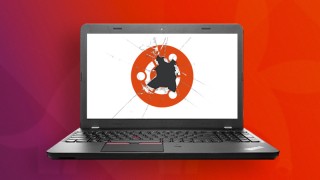Ubuntu 17.10 crashes BIOS on some Lenovo, Acer and Toshiba laptops
 Canonical has withdrawn the Ubuntu 17.10 distribution released in October and hid the link on the download site . The reason was a critical bug with BIOS damage in some models of Lenovo laptops and one Acer model. The full list of affected models is currently being updated and updated.
Canonical has withdrawn the Ubuntu 17.10 distribution released in October and hid the link on the download site . The reason was a critical bug with BIOS damage in some models of Lenovo laptops and one Acer model. The full list of affected models is currently being updated and updated. The damage to the BIOS is manifested in the fact that the new settings can no longer be saved, and after a reboot, the laptop starts with the old settings.
Worse, the boot from a USB flash drive breaks down because USB is not recognized.
Judging by the description of the bug, it seems to be happening after activating the intel-spi- * drivers in the kernel. Apparently, these drivers are not yet fully developed and are not ready for use on user systems.
As a workaround, you can try to disable the drivers intel-spi- *. In the description of the bug noted that the consequences of such actions will be minimal: "It is unlikely that someone really does something that requires this driver."
The list of affected laptop models:
- Lenovo B40-70
- Lenovo B50-70
- Lenovo B50-80
- Lenovo Flex-3
- Lenovo Flex-10
- Lenovo G40-30
- Lenovo G50-70
- Lenovo G50-80
- Lenovo S20-30
- Lenovo U31-70
- Lenovo Y50-70
- Lenovo Y70-70
- Lenovo Yoga Thinkpad (20C0)
- Lenovo Yoga 2 11 "- 20332
- Lenovo Z50-70
- Lenovo Z51-70
- Lenovo Ideapad 100-15IBY
- Acer Aspire E5-771G
As already noted, the list is updated.
In the comments for the bug, the Toshiba L50B-23G model is also mentioned.
In numerous forums, users complain about this problem, because many laptops do not have CD-ROM drives - so they can not boot from another distribution.
Especially a lot of complaints on the Lenovo forums. This is especially unpleasant, because often Lenovo ThinkPad notebooks are often recommended for use with Linux, and at Canonical at offsite they are included in the list of officially supported hardware.
In previous versions of Ubuntu, the bug does not appear.
Theoretically, the BIOS can be reflashed and returned to its original state (for example, using a programmer), but this is a nontrivial and slightly risky procedure. In addition, not every user has a programmer. Therefore, you can understand the strong discontent of those who are faced with this problem and can not download a laptop. “This is unacceptable, right now my Lenovo G50-80 has turned into a brick,” writes one of the victims in the comments to the bug on the Canonical site.
UPD. User's note r0mik in the comments to the article: “it is not BIOS that is corrupted” in the literal sense - the SPI Flash chip is locked to the record. Apparently, this happens through the aforementioned kernel module, since only he is capable of such actions (for this, including, and was written). It is precisely from the fact that SPI Flash is hardware locked up for writing that no means of rolling back to the standard BIOS settings will work, because the settings are stored in SPI Flash. The programmer will not help either. Only a physical replacement of the chip will help ...
Canonical is now actively working with Lenovo to find the true cause of the problem and release the patch. New Ubuntu 17.10 images are being prepared with an updated kernel that will not break the BIOS on new installations.
Unfortunately, the new images will not help those who have already installed Ubuntu 17.10 and damaged the BIOS firmware. The extreme case is to carry a laptop for repair to replace the motherboard. If the laptop is still loading, then you can try such a workaround that is offered on Lenovo technical support forums.
This user also lost the preservation of new BIOS settings and lost the ability to boot from USB. First, he checked the EFI boot sequence. This is done by the following command:
efibootmgr -vIn his case, the boot sequence looked like this:
BootCurrent: 0001
Timeout: 0 seconds
BootOrder: 0001,0002,2001,2002,2003
Boot0001* antergos_grub HD(1,GPT,f128f12b-fa3e-45b1-b5c9-f03c328498cb,0x800,0x64000)/File(\EFI\antergos_grub\grubx64.efi)
Boot0002* Windows Boot Manager HD(1,GPT,f128f12b-fa3e-45b1-b5c9-f03c328498cb,0x800,0x64000)/File(\EFI\Microsoft\Boot\bootmgfw.efi)RC
Boot2001* EFI USB Device RC
Boot2002* EFI DVD/CDROM RC
Boot2003* EFI Network RCFrom this it follows that the first in any way will be loading grubx64.efi from the antergos_grub directory and only from the specified disk.
It is logical to assume that we can manage the download by changing the contents of the antergos_grub folder. He simply replaced the contents of this folder with the contents of the rEFInd download manager package , while renaming refind_x64.efi to grubx64.efi. Then, after loading the laptop, the standard boot menu rEFInd appears.
